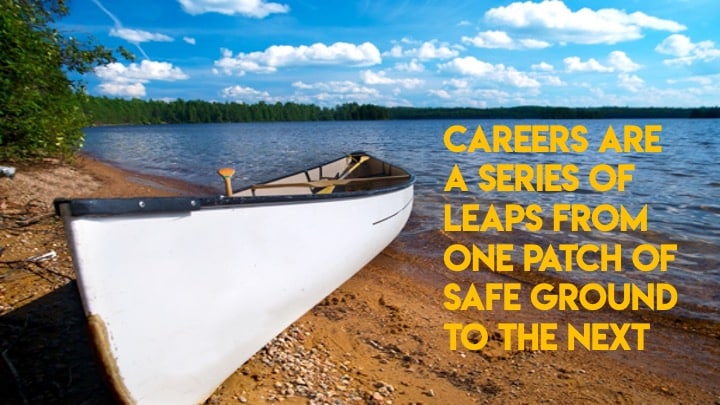Careers theory used to be all about the importance of a plan. I’ve lost count of the number of career presentations I’ve seen over the years that warn of the dangers of drifting without one. Many warnings include a version of the popular Alice in Wonderland white rabbit misquote:
‘If you don’t know where you are going, any road will take you there.’
Lewis Carroll never even wrote that. I’m told it’s from a George Harrison song, Any Road.
Your parents probably had sensible career plans. They had fewer options and grabbed opportunities for social mobility. They didn’t always have the luxury of questioning their choices.
Career choices are more ambiguous and bewildering now. It’s hard to have a long-term plan when we can’t predict what tomorrow will hold. If we try to hang on to a rigid plan we risk missing out on exciting curve-balls. It’s much more useful to keep noting what you enjoy doing, where you get your energy from and what you want to learn next, than to be overly specific about what you ‘should’ do next.
Up to 1900 the knowledge in the world doubled every 100 years. Now knowledge, or more realistically, ‘content’, doubles every single day. The ability to analyse it critically is almost more desirable than the knowledge itself because that becomes out of date so quickly. That’s one reason why we are all so crazy busy: we are overwhelmed trying to stay fresh.
Some of the jobs that people do today didn’t exist until recently. Space cadet used to be an insult but now it’s a realistic job option. Ten years ago no one had titles like crypto engineer, autonomous vehicle designer, app developer, content creator or big data analyst.
According to a report published by Dell Technologies and authored by the Institute for the Future (IFTF), an astonishing 85 per cent of the jobs that will exist in 2030 have yet to be created. Many jobs will disappear because of AI, but it will also create exciting opportunities provided we have the energy and curiosity to capitalise on them.
Stop comparing yourself to others
Our perception of career and life success comes from many sources: our parents’ expectation, our peers, colleagues, classmates, neighbours, friends. We benchmark our extrinsic success against theirs; where we think we ‘should’ be. I love the saying that money doesn’t matter – as long as you earn more than your brother-in-law.
Author and philosopher Alain de Botton believes we are all ‘job snobs’ now. We judge people by their job title, commonly with envy and some comparison with our own job. We’re only imagining the real picture. People’s LinkedIn profiles are rarely an accurate reflection of their daily grind.
You do you
How you spend your days should fit your values and priorities. If you are a parent who rarely shows up at the school gates, that’s fine. If you choose to work part time to take care of your dog, that’s also fine. Some people give up corporate life to take a risk. Others stay on the corporate track because they like the security of the greasy pole.
Do what feels right for you now. You can always change later. Just do it deliberately, not from fear of change.
My ‘scrappy careers’ theory
Careers are made up of a sequence of stages. Some stages are in work, some away from work to travel ortake on caring responsibilities or study. These stages might mean taking lateral moves in search of deeper expertise, straight up the ladder moves, or taking time out to do something radically different. There are many twists and turns instead of a straight line. We can expect at least eight or nine steps. You have probably had several pivots and reinventions yourself. I certainly have.
We can remove the pressure if we see each career stage as a patch of safe ground where we accumulate as many skills, networks, and experiences as possible. Once we’ve outgrown a stage, we can move on to the next patch of safe ground. We keep doing this and usually can’t see more than a couple of patches ahead, but we aren’t worried about that. As we move, the fog clears and we can see a little further ahead. What’s important is that we keep moving, learning, connecting and growing.
It’s a more scrappy, entrepreneurial approach to work. We make the most of where we are, contributing as much as we can, then move on when the time is right and take our skills elsewhere. We may go back to previous employers once we have accumulated extra experience, something they might find valuable. That’s a far better approach than being stale and underproductive because we’ve outgrown our role.
Life is a team sport. The one thing that hasn’t changed about work is that who you know matters. We often underestimate the value of our networks for offering opportunities and vital feedback.
Not everyone has found a calling or North Star, despite all the books and videos that tell us how. Some never do. But we all need some sense of purpose, where we get our meaning and sense of wellbeing from. Why do you get up in the morning?
Some questions to reflect on over the holidays:
If you made a career change, how would you know in a year’s time that you had made the right decision? How would you feel differently?
If success was guaranteed for you, what would you do next?
Where can I find time in my calendar for more in-person networking and who is on my list?
This is abridged from Jules’ story in Badly Behaved People, the only business book that will make you laugh on the plane. If you are looking for more detail about career moves, then Mind Flip is your book for the beach.

